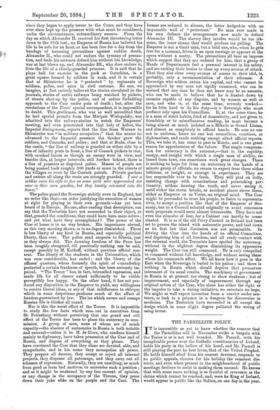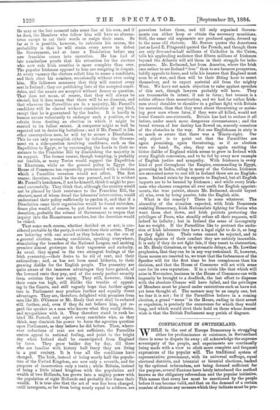THE PARNELLITE POLICY.
IT is impossible as yet to know whether the rumour that the Parnellites will in November strike a bargain with the Tories is or is not well founded. Mr. Parnell, with his inexplicable power over the Catholic constituencies of Ireland, holds his party in the hollow of his hand, and Mr. Parnell is still playing the part he best loves, that of the Veiled Prophet. He holds himself aloof from his nearest devotees, responds to no public appeals, chooses for his holiday the remotest dis- tricts, and even when present in the neighbourhood of public meetings declines to assist in making them succeed. He knows that with some races nothing is so fruitful of reverence as the shrine which cannot be reached, and, were he King of Ireland, would appear in public like the Sultan, on one day in the year. He may at the last moment take some line of his own, and if he does, the Members who follow him will have no alterna- tives except to eat their words or resign their seats. So far as it is possible, however, to calculate his course, the probability is that he will strain every nerve to defeat, the Government, and so force a Dissolution before any new franchise comes into operation. He has had of late numberless proofs that his attraction for the electors who now rule Irish counties is more complete than ever. The popular Irishmen opposed to him are resigning in despair. At every vacancy the electors solicit him to name a candidate, and then elect his nominee, occasionally without even seeing him. His followers announce that they will contest every seat in Ireland ; they are publishing lists of the accepted candi- dates, and the names are accepted without demur or question. That does not mean, of course, that they will always be elected, but it does mean that there will be no disunion, and that wherever the Parnellites are in a majority, Mr. Parnell's candidate will be elected without consideration of any kind, except that he is guaranteed by the leader. It is hardly in human nature voluntarily to endanger such a position, or to refrain from desiring an election in which it might be exerted to its fullest extent. A conqueror might as well be expected not to desire big battalions ; and if Mr. Parnell is like other unscrupulous men, he will try to secure a Dissolution. This he can only accomplish either by defeating the Govern- ment on a side-question involving confidence, such as the Expedition to Egypt, or by encouraging the Lords in their re- sistance to the Franchise Bill by diminishing the majority in its support. The former course, though tempting, is probably not feasible, as many Tories would support the Expedition to Khartoum, while on the general policy in Egypt the House of Commons has repeatedly pronounced with a decision which a Parnellite secession would not affect. The first course, therefore, would be the one pursued, and it is evident Mr. Parnell's henchmen, if not he himself, think it might be pur- sued successfully. They think that, although the country would not be pleased by their resistance to the Franchise Bill, the electors, most of whom dread the labourers' intervention, would understand their policy sufficiently to pardon it, and that if a Dissolution came their organisation would be found unbroken. Some plea would, of course, be put forward as an excuse for desertion, probably the refusal of Government to reopen that inquiry into the Maamtrasna murders, but the desertion would be risked.
That some such course, whether decided on or not, is con- sidered probable by the party, is evident from their action. They are behaving with one accord as they behave on the eve of a general election, naming candidates, speaking everywhere, stimulating the branches Of the National League, and making promises almost grotesque in their vagueness and audacity. As usual, they appeal to the two strongest feelings of the Irish peasantry,—their desire to be rid of rent, and their. nationalism ; and, as 'has not been usual hitherto, to their growing dislike for the English people. The peasantry are quite aware of the immense advantages they have gained, of• the lowered rents they pay, and of the nearly perfect security from eviction they now enjoy. They still, however, think their rents too high, still dislike the trouble of appeal- ing to the Courts, and still vaguely hope that further agita- tion in Parliament may produce further and equally direct advantages. They are, therefore, delighted with promises from men like Mr. O'Connor or Mr. Healy that rent shall be reduced still further, and, even if they do not believe him, yet re- gard the speaker as a man who knows what they really desire, and sympathises with it. They therefore stand in rank be- hind Mr. Parnell, and reject every candidate who, as they think, may diminish his power to force the agrarian question upon Parliament, as they believe he did before. Then, where- ever reductions of rent are not sufficient, the Parnellite orators appeal to national feeling, and point to the bright day when Ireland Shall be emancipated from England by force. They grow holder day by day, till those who are familiar with history half fancy they are living in a past century. It is true all the conditions have changed. The Irish, instead of being nearly half the popula- tion of the United Kingdom, are now only a seventh, and for purposes of insurreetion only a tenth ; while Britain, instead of being a little island 'kingdom with the population and wealth of two Holland, has grown into a mighty power with the population of eight Hollande and probably five times their wealth. It is true also that the art of war has been changed, until insurgents, so far from being nearly equal to soldiers, are powerless before them, and till only organised Govern- ments can either keep or obtain the necessary munitions. Still, the same old arguments are produced again, dressed up in the same old rhetoric. Mr. Sexton quotes the Americans just as Lord E. Fitzgerald quoted the French, and though there are only five-and-a-half millions of Catholics in the Union, tells his applauding audience that fifteen millions of Irishmen beyond the Atlantic will aid them in their struggle for inde- pendence. Mr. Redmond, hot from America, where the Irish care rather to see Ireland " free" than to see farmers prosperous, boldly appeals to force, and tells his hearers that England must soon be at war, and then will be their fitting hour to assert themselves, and to expect material aid from the mighty West. We have not much objection to raise against speeches of this sort, though lawyers probably will have. They are treasonable in intent, if not in form ; but treason is a nobler offence than assassination, and we had far rather Irish- men stood shoulder to shoulder in a gallant fight with Britain for secession, than that they went about threatening or maim- ing poor men whose fates, if they were all killed, would not lower Consols one-sixteenth. Britain has had to endure it all before, under much more dangerous circumstances ; and the broad stream of her destiny has flowed on, scarcely conscious of the obstacles in the way. Not one Englishman in sixty is so much as aware that there was a 'Ninety-eight. Our only object is to point out that the Parnellites are again promising, again threatening, as if an election were at hand. So, also, they are again exciting the bitter dislike of England which seems to grow in Ireland with every English concession, and to be fed by every new example of English justice and sympathy. With Irishmen in every kind of post throughout the Empire, commanding in Egypt, governing in India, ruling in many of the Colonies, Irishmen are entreated never to rest till in Ireland there are no English- men. Ireland exists by its exports to England, but all English imports are to be banned by Irishmen ; and while every Irish- man who chooses competes all over earth for English appoint- ments, the true patriot, shouts Mr. Redmond, should boycot all who, even by being passive, take the English side.
What is the remedy? There is none whatever. The absurdity of the situation expected, with Irish Democrats resisting Democracy, Irish Nationalists fighting for Tories who want them shot down, and Irish patriots protecting the privileges of Peers, who steadily refuse all their requests, will indeed be infinite ; but in Ireland the sense of incongruity has no weight. If the Parnellites like to protract the exclu- sion of Irish labourers they have a legal right to do it, so long as they fight fair. Their votes cannot be rejected, and to English opinion of their conduct they are entirely insensible. It is only if they do not fight fair, if they resort to obstruction, as Mr. Healy threatens, or to systematic delays, as Mr. Lowther prophesies, that they can be in any way restrained. If, however, these means are resorted to, we trust that the forbearance of the Speaker will for the first time be less conspicuous than his decision, and that the House of Commons will act with some care for its own reputation. If in a crisis like that which will arise in November, business in the House of Commons can with impunity be brought to a deadlock, the last effort to dispense with the absolute Closure will have failed, and the privileges of Members must be placed under restrictions such as have not yet been thought of. The menace may be an empty one, but we fear it is not ; for if the Parnellites believe in a coming election, a grand " scene " in the House, ending in their arrest or expulsion, is precisely the occurrence for which they would long, and which would rivet their hold on those whose dearest wish is that the British Parliament may perish of disgrace.



































 Previous page
Previous page